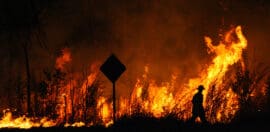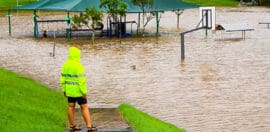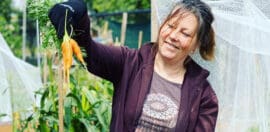Effecting change in the climate crisis

21 December 2022 at 2:11 pm
What does the Sunrise Project’s Climate Compass research tell us about how individuals are willing to act on climate change mitigation measures?
If you’ve ever allowed your thoughts to linger on the consequences of global warming, you’ll quickly see the signs of collapse in our complex and intertwined climate system.
The fear of devastating tipping points throwing our lives into permanent chaos feels too close for comfort, because it is.
As I write this, parts of northern-NSW are recovering from their third extreme flooding event this year while western parts of the state are still isolated after record rainfall and Sydney passed its highest ever yearly rainfall in early October.
The word ‘unprecedented’ has become a kind of wicked cliché of the times we are in.
Hundreds of public opinion polls, dozens of research projects and thousands of dinner table conversations over more than a decade have repeatedly shown us that Australians agree climate change is something we need to act on now and support for renewables has remained consistently high.
Despite this broad support across the community, we’ve experienced too many years of delay, distraction and denial and learned the hard way how toxic, divisive politics can dismantle sensible and necessary decarbonisation policies in a heartbeat.
Taking the temperature of the nation’s attitudes on climate change is an approach that simply doesn’t meet the scale of the challenge we have to shift our society and economy before this decade is out.
We need to know what drives people’s propensity to act – in their own lives, in their communities and workplaces too. Crucially, we also need to understand what will engage people in influencing policies that can accelerate climate solutions, the biggest lever we can pull to course-correct in the time we have.
It is these questions that drove The Sunrise Project to create Climate Compass, a comprehensive research project that seeks to understand the nuance of Australians’ responses to the climate challenge.
Climate Compass began in 2020 amid the first wave of the pandemic and was updated in August 2022. The research aims to go beyond standard metrics that demonstrate Australians’ increasing sense of worry about climate change, or levels of support for the myriad climate solutions we can deploy to ensure a faster and fairer transition to a cleaner, regenerative economy and society. Instead the project builds a deep understanding of the specific audiences’ attitudes to climate change and the values, ideologies and emotions that underpin them. The research aims to build an understanding of what motivates action and the barriers that prevent people from leaping in.
As part of the 2022 research phase, we presented 3,600 Australians with a list of 20 actions and behaviours related to climate change, and asked which behaviours they had ever done, were open to doing or would never do.
This included personal response behaviours, like putting solar panels on the roof and recycling, donating or joining an environmental charity or switching to a carbon-neutral super fund or bank. Campaigning actions like signing a petition, writing to your member of parliament and voting at elections were added to the list.
We asked respondents to rank each of the behaviours they were open to doing by how easy it was to do and how much of an impact they thought it would have on climate change.
Australians ranked “voting for a party based on their climate policy” as both easy and high impact, encouraging to see following the unprecedented shift in our democracy at the May poll. Crucially, the research showed that climate change was the top factor for voters who moved their vote to an independent candidate (47 per cent) and the number two factor for voters who swung to Labor (42 per cent).
That’s the people power that fuelled a historic shift in the makeup of the federal parliament.
Encouragingly Australians also told us they believe it is easy to talk to family and friends about climate action or take other personal advocacy actions, like posting on social media and signing petitions, but unfortunately believe these actions are low-impact.
This insight is telling for advocates who know the power of conversation with a trusted friend, relative or colleague. The perfect messenger will trump the perfectly crafted messenger, every time.
From the barbecue-stopper on how much a rooftop solar system saves on the family electricity bill, to the thousands of locals that fuelled the community independents movement, conversations power social movements. People with high levels of climate concern tell us these behaviours are easy and doable, so we need to show them their voice is one of the most important tools in our climate-solutions kit bag.
Australia is embarking on a transition of our society and economy that is as unprecedented as the cascade of climate-fuelled disasters that have harmed so many communities in recent years. The positive tipping points we need are quickly arriving: technology is racing ahead, economics are consolidating around clean solutions, and the debate is shifting to focus on climate justice, a conversation that is long overdue.
The encouraging lesson we can draw from Climate Compass is that levels of community concern are climbing, and people are open to taking new forms of action.
The more efforts, time and resources we can direct to helping people claim their agency – in their communities, workplaces, sporting clubs, places of worship and at the ballot box – the more chance we have of creating a safer, healthier planet for all.







